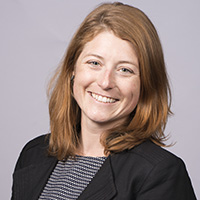Angela Huston
Systems change specialist

Angela is an interdisciplinary WASH specialist who holds a Bachelor of Science in Environmental Chemistry and a Master of Science in Civil Engineering. She takes an action-research approach to her work and in collaboration with IRC is undertaking PhD research to better understand WASH systems strength and measure the impact of systems-change initiatives over time. Angela is focused on the monitoring and sanitation profiles at IRC, where she aims to bring holistic thinking to a practicable level when working with local partners in resource-limited environments.
Angela has a quantitative and qualitative research background including water quality analysis, participatory methods and focus group facilitation. She is experienced in the evaluation of small and medium sized drinking water systems in addition to sanitation assessments, including faecal waste mapping and the integration of essential social, cultural, and financial components impacting sustainability.
Angela is a dynamic communicator with experience of facilitating both community workshops and national government stakeholder forums in Africa and internationally. She has a natural ability to adapt language and content to her audience in order to promote collective capacity building, and is an organised group coordinator who motivates timely implementation and delivery even when working in diverse contexts. She speaks English, French and Spanish.
Angela has current activities in East and West Africa. She is working with UNICEF on the DGIS WCARO supported programme to strengthen country-led monitoring systems in west and central Africa. Angela is leading the Agenda for Change Working Group on Monitoring, Evaluation, and Learning and is also working closely on the research and learning component of a USAID funded Sustainable WASH Systems action-research programme focused in Ethiopia and Uganda. She provides support to the IRC Burkina Office on sanitation and has completed working with IRC Consult on the Qualitative Participatory Assessment project with the World Bank in Tanzania.
Angela is an interdisciplinary WASH specialist who holds a Bachelor of Science in Environmental Chemistry and a Master of Science in Civil Engineering. She takes an action-research approach to her work and in collaboration with IRC is undertaking PhD research to better understand WASH systems strength and measure the impact of systems-change initiatives over time. Angela is focused on the monitoring and sanitation profiles at IRC, where she aims to bring holistic thinking to a practicable level when working with local partners in resource-limited environments.
Angela has a quantitative and qualitative research background including water quality analysis, participatory methods and focus group facilitation. She is experienced in the evaluation of small and medium sized drinking water systems in addition to sanitation assessments, including faecal waste mapping and the integration of essential social, cultural, and financial components impacting sustainability.
Angela is a dynamic communicator with experience of facilitating both community workshops and national government stakeholder forums in Africa and internationally. She has a natural ability to adapt language and content to her audience in order to promote collective capacity building, and is an organised group coordinator who motivates timely implementation and delivery even when working in diverse contexts. She speaks English, French and Spanish.
Angela has current activities in East and West Africa. She is working with UNICEF on the DGIS WCARO supported programme to strengthen country-led monitoring systems in west and central Africa. Angela is leading the Agenda for Change Working Group on Monitoring, Evaluation, and Learning and is also working closely on the research and learning component of a USAID funded Sustainable WASH Systems action-research programme focused in Ethiopia and Uganda. She provides support to the IRC Burkina Office on sanitation and has completed working with IRC Consult on the Qualitative Participatory Assessment project with the World Bank in Tanzania.
Collaborative and iterative learning are essential to understanding the complex systems we exist in. This permits us to mindfully initiate positive change towards a better future.Angela Huston
Angela is an interdisciplinary WASH specialist who holds a Bachelor of Science in Environmental Chemistry and a Master of Science in Civil Engineering. She takes an action-research approach to her work and in collaboration with IRC is undertaking PhD research to better understand WASH systems strength and measure the impact of systems-change initiatives over time. Angela is focused on the monitoring and sanitation profiles at IRC, where she aims to bring holistic thinking to a practicable level when working with local partners in resource-limited environments.
Angela has a quantitative and qualitative research background including water quality analysis, participatory methods and focus group facilitation. She is experienced in the evaluation of small and medium sized drinking water systems in addition to sanitation assessments, including faecal waste mapping and the integration of essential social, cultural, and financial components impacting sustainability.
Angela is a dynamic communicator with experience of facilitating both community workshops and national government stakeholder forums in Africa and internationally. She has a natural ability to adapt language and content to her audience in order to promote collective capacity building, and is an organised group coordinator who motivates timely implementation and delivery even when working in diverse contexts. She speaks English, French and Spanish.
Angela has current activities in East and West Africa. She is working with UNICEF on the DGIS WCARO supported programme to strengthen country-led monitoring systems in west and central Africa. Angela is leading the Agenda for Change Working Group on Monitoring, Evaluation, and Learning and is also working closely on the research and learning component of a USAID funded Sustainable WASH Systems action-research programme focused in Ethiopia and Uganda. She provides support to the IRC Burkina Office on sanitation and has completed working with IRC Consult on the Qualitative Participatory Assessment project with the World Bank in Tanzania.
Collaborative and iterative learning are essential to understanding the complex systems we exist in. This permits us to mindfully initiate positive change towards a better future.Angela Huston